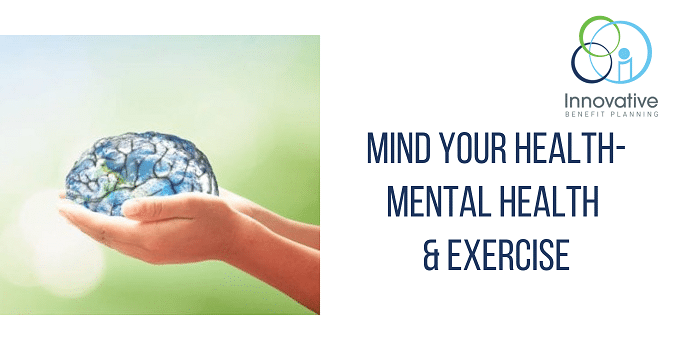Mind Your Health-Mental Health & Exercise

You have probably heard of the variety of benefits from weekly exercise….
But did you know that exercise can do wonders for both physical AND mental health? People who exercise regularly gain a sense of well-being, feel more energetic throughout the day, have a better quality of sleep, and have a greater sense of positivity. Studies have shown that regular exercise has a profoundly positive impact on depression, anxiety, ADHD and several other mental health conditions. Additionally, inactivity could contribute to poor mental health and reduced feelings of well-being.
A study published in 2018 examined participants with an average experience of 3.4 days of poor mental health each month. Compared to people who reported no exercise activity, participants who exercised reported 1.5 fewer days of poor mental health each month – a reduction of 43%. Types of exercise with the strongest association of improved mental health included team activity, cycling, aerobic activity and gym exercise. The study also noted that participants who exercised between three and five times per week for 30-60 minutes had more of a benefit than those who exercised less per week.1
H** ow does exercise help mental health?**
Exercise influences beneficial effects on the release of several neurotransmitters that affect conditions such as anxiety and depression including serotonin, norepinephrine, dopamine and the endorphins. Endorphins are a type of neurotransmitter that helps to relieve pain and stress. Increased serotonin levels in the body improve mood and overall sense of well-being. Regular physical activity also helps to balance the body’s level of stress hormones such as adrenaline and cortisol.2
The Centers for Disease Control and Prevention recommends that adults who are physically capable get at least 150 minutes of moderate-intensity aerobic activity per week. It is also recommended to plan at least two sessions of muscle-strengthening activities per week.3 Examples of moderately intense activity include walking briskly, water aerobics, dancing and biking 10mph.
Here are some clues that your exercise intensity is at a moderate level:
- Your breathing quickens, but you’re not out of breath.
- You develop a light sweat after about 10 minutes of activity.
- You can carry on a conversation, but you can’t sing.
1 The Lancet. “Exercise linked to improved mental health, but more may not always be better.” ScienceDaily. ScienceDaily, 8 August 2018. www.sciencedaily.com/releases/2018/08/180808193656.htm.
2 Paluska and Schwenk. “Physical Activity and Mental Health: Current Concepts”. https://www.ncbi.nlm.nih.gov/pubmed/?term=Paluska+SA%2C+Schwenk+TL.+Physical+activity+and+mental+health
3 “American Heart Association Recommendations for Physical Activity in Adults and Kids.” Www.heart.org, www.heart.org/en/healthy-living/fitness/fitness-basics/aha-recs-for-physical-activity-in-adults.
Innovative’s Workplace Wellness
Innovative’s Workplace Wellness assists employers in creating a culture of health. Our skilled wellness team works hand-in-hand with organizations to design and implement customized wellness programs that improve your population health and ultimately lower claims costs. Workplace wellness is more than keeping your team physically healthy. It’s about empowering employees to be their best, creating a fully engaged staff and making them advocates of their health. We help employers focus on each individual employee, guiding your team to effectively manage their own mental, physical, and emotional energy so your employees and your business thrive. To learn more, visit here.
Categories
Archive








